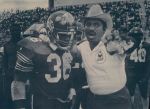WASHINGTON (AP) — Tennessee lawyer Brian Manookian says he never considered himself a gun enthusiast. He owns just one handgun and was raised in a gun-free home. But the firearms industry has proven so successful in recent years that he decided to give up practicing law and make guns his livelihood.
It's a decision that's put Manookian on track to earn four times what he made as a corporate health care attorney, a job that earned him six figures right out of law school, he said.
And he's far from alone. An analysis by The Associated Press of data tracking the health of the gun industry shows that President Barack Obama has presided over a heyday for guns.
Sales are on the rise, so much that some manufacturers cannot make enough fast enough. Major gun company stock prices are up. The number of federally licensed, retail gun dealers is increasing for the first time in nearly 20 years. The U.S. gun lobby is bursting with cash and political clout. Washington has expressed little interest in passing new gun laws, despite renewed calls to do so after recent deadly shootings in Colorado and Wisconsin.
Four years ago the gun lobby predicted Obama would be the "most anti-gun president in American history." Yet it is hard to find a single aspect of the gun world that isn't thriving.
"The driver is President Obama. He is the best thing that ever happened to the firearm industry," said Jim Barrett, an industry analyst at C.L. King & Associates Inc. in New York.
Obama has made no pledges to push for new gun control legislation and does not have the support in Congress or among voters even if he did. During this week's presidential debate, he did suggest renewing a U.S. ban on assault weapons and coming up with an overall strategy to reduce violence. But both Obama and Republican presidential nominee Mitt Romney said the real need is for the government to enforce gun laws already on the books.
Meanwhile, sales are brisk.
Since opening a $5 million armory in Nashville last month, Manookian and his business partner have outdone their own expectations, selling inventory three to four times faster than they expected. The facility has high ceilings and granite fixtures in the bathroom and provides instructional courses and a shooting range in addition to firearms for sale.
"It is a very strong investment," Manookian said.
Others agree.
For the first time since 1993, the number of federally licensed retail gun dealers in the U.S. increased slightly in 2010 and 2011. The country added 1,167 licensed retail gun dealers, according to Bureau of Alcohol, Tobacco, Firearms and Explosives records. After the assault weapons ban of 1994 — now expired — the number of gun dealerships dropped annually until 2010. As of October 2012, there were 50,812 retail gun dealers — 3,303 more than in 2009.
"Business has been very good," said Frederick Prehn, who a year ago opened a small gun store above his dentistry practice in Wausau, Wis. In the past year, Prehn has relocated twice to larger spaces and gone from one employee to eight.
Some gun store owners can't keep shelves stocked, said Brian Jones, owner of Bullseye Shooter's supply in Painted Post, N.Y. Jones said he opened his gun store in November 2010. In his first year, he said he sold between 600 and 700 guns. A little more than halfway through his second year, he's already sold 700.
For the first time in the company's history, Sturm Ruger & Co. Inc. stopped taking orders for a couple of months this year. Ruger, one of the nation's largest gun manufacturers, has since resumed taking orders, though gun-sellers say demand is still outpacing production.
Dan Wesson Arms, Inc., a small gun manufacturer that sells to a niche market, stopped taking orders this spring because the company had sold out the entire year's production, spokesman Jason Morton said. The company has stopped taking orders before, but never so early on the entire line, he said.
"Wouldn't you want to be in a business where customers are just begging to hand you money?" said Bill Bernstein, owner of East Side Gun Shop in Nashville.
Obama is not yet through his first term, but the federal government already has conducted about as many background checks for gun owners and prospective buyers on his watch as it did during the first six years of George W. Bush's presidency. In the first 3 1/2 years of the Bush administration, the FBI conducted about 28 million background checks. During the same period of the Obama administration, the FBI conducted more than 50 million. The gun industry uses the number of background checks as a reliable indicator of demand.
Ruger and Smith & Wesson represent nearly 30 percent of the U.S. gun manufacturing industry and lead the market in production of pistols and revolvers, according to government statistics. The two companies have been running production lines around the clock, hiring workers and operating at maximum capacity, said Barrett, an industry analyst who also owns Ruger stock.
Ruger's sales have increased 86 percent since Obama took office, and Smith & Wesson's sales have gone up nearly 44 percent, compared with 18 percent for overall national retail sales.
And the companies have big expectations for the industry's future, as they're spending more money on research and development than ever before.
The NRA itself has done well, too. The lobbying organization has had more cash on hand during the Obama years than it had since 2004, finishing 2010 with more than $24 million, according to the most recent figures available.
"Which makes it incredibly ironic that the gun lobby is opposing Obama," said Dan Gross, president of the Brady Campaign to Prevent Gun Violence. Gross said Obama, who initially campaigned to reinstate the assault weapons ban that expired under Bush, has done what he said was "disappointingly little" on gun control.
But the gun lobby says the success of the industry does not indicate that Obama is good for Second Amendment rights.
"This is the most dangerous election in our lifetimes," NRA chief executive officer Wayne LaPierre said in February, a point he's made regularly during the NRA's campaign to defeat Obama.
The gun lobby stands by its 2008 predictions that Obama would be anti-gun. NRA spokesman Andrew Arulanandam noted Obama's appointment of two Supreme Court justices whom the NRA considers anti-gun, plus Obama's support of a United Nations arms trade treaty and the botched operation called Fast and Furious, which the NRA says was concocted as part of a plan to enforce new gun restrictions.
"Gun owners and hunters fear that a second Obama administration with no future political campaigns to worry about will try to destroy this great American freedom," Arulanandam said.
Fears of a Democratic president taking office and issuing stricter gun control laws led to an initial spike in gun sales in 2008, giving dealers some of the highest profit margins they'd ever seen. But even after it became clear Obama was not going to make gun control a priority as president, the industry has continued to do well.
Fear of crime may be driving some sales. The number of violent crimes rose by 18 percent in the U.S. in 2011, according to Justice Department figures released this week. It was the first year-to-year increase for violent crime since 1993, marking the end of a long string of declines.
Firearm sales typically increase during poor economic times, said Steve Sanetti, chief executive officer and president of the National Shooting Sports Foundation, a trade association for the industry. More Americans are hunting and shooting for recreation as well, he said. Sanetti attributes that to military servicemen and women with firearms experience returning to civilian life and wanting to keep up with shooting as a pastime. He also said recreational shooting is a relatively cheap and accessible hobby, drawing in new buyers.
Voters have made clear that gun control isn't a priority. A recent AP-National Constitution Center poll found that 49 percent of adults felt laws limiting gun ownership infringe on the public's right to bear arms, while 43 percent said such laws do not infringe on those rights. After the recent mass shootings in Colorado and Wisconsin, 52 members of Congress sponsored a bill to track bulk sales of ammunition, but the legislation went nowhere.
The firearms industry entrepreneur Manookian said it is clear that guns are a priority for Americans. People around the country are waiting in lines at shooting ranges, he said, cash registers at gun stores are ringing with $1,000 purchases and his brand new armory in Nashville is in the black two weeks after it opened.
















